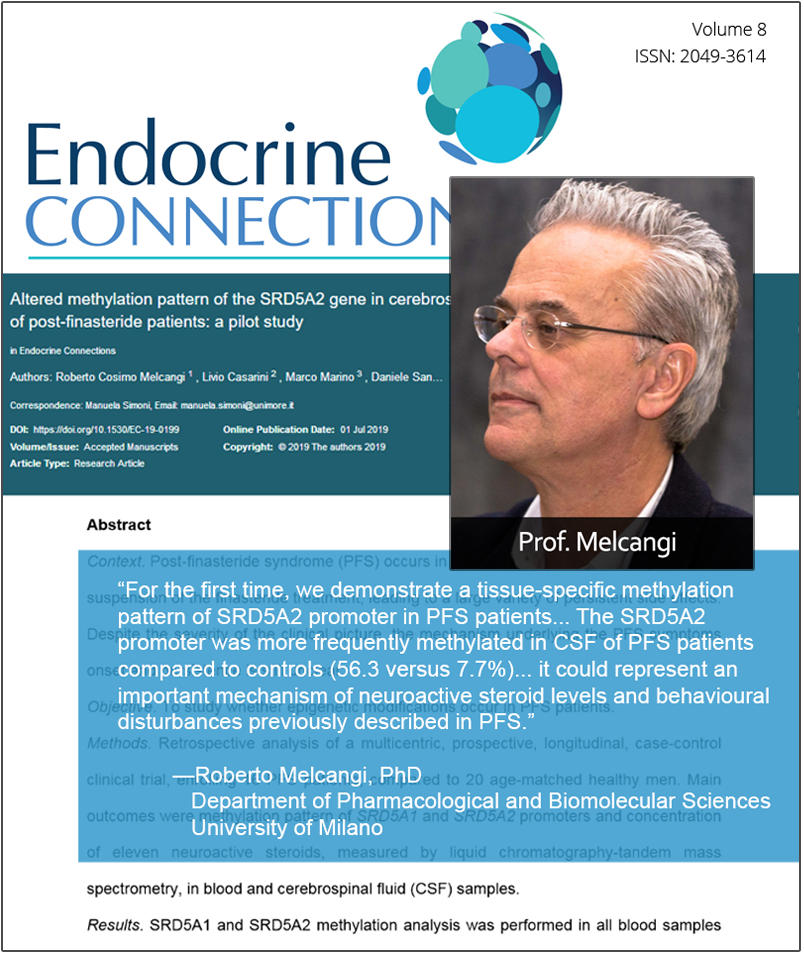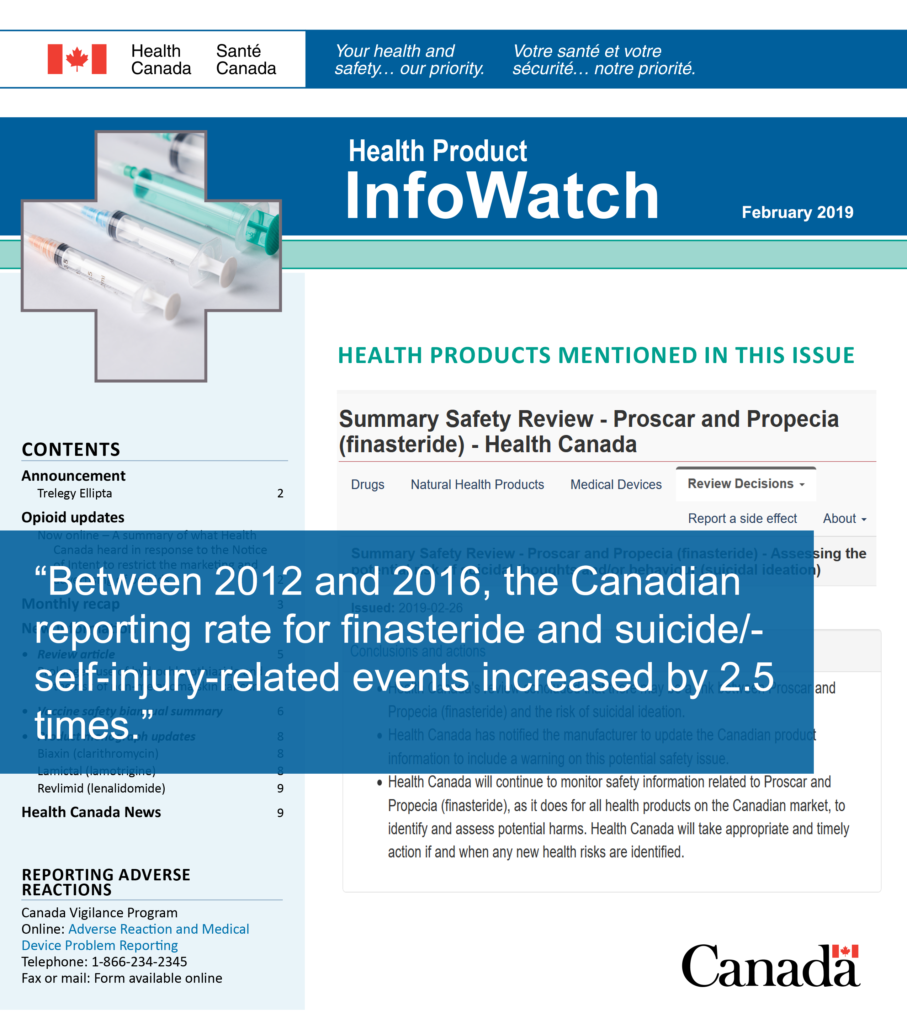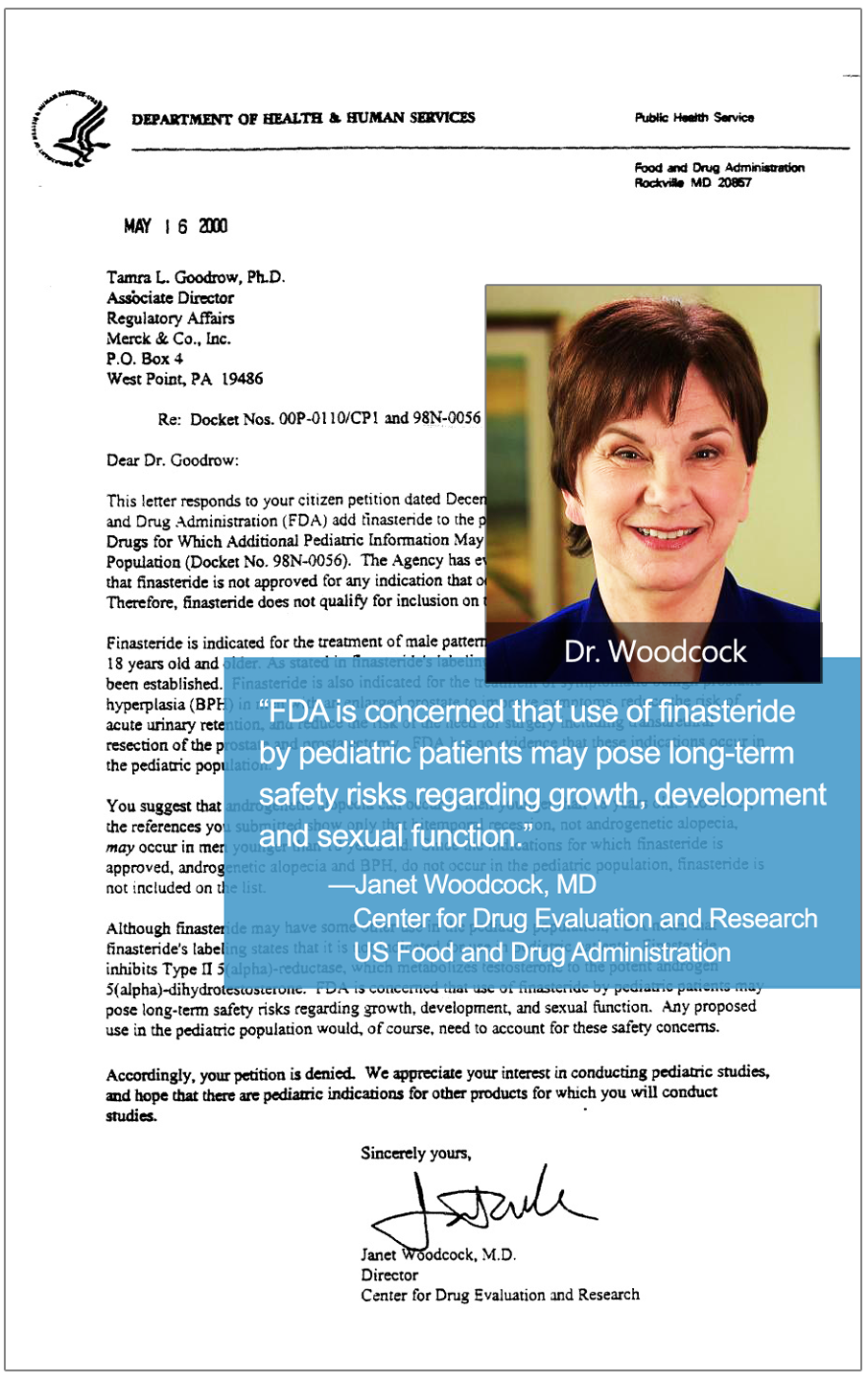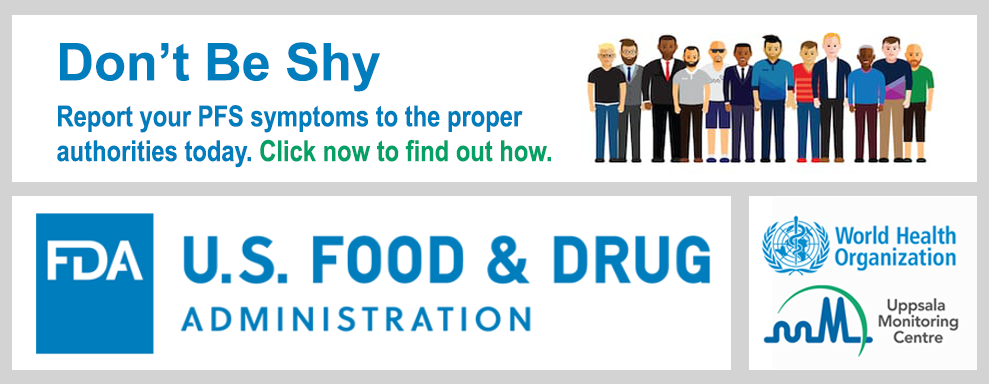Aug. 4, 2019
Dear Friends:
Irrefutable. It’s a word we’re aiming to make synonymous with PFS by August 2022, when this foundation turns 10.
That leaves us just 41 months. But if recent activity on the research and regulatory fronts are any indication—to say nothing of the surge in efforts by patients and their loved ones—it’s safe to say we have a fighting chance.
What will a world in which PFS is irrefutable look like? For one, no doctor will dismiss a patient’s symptoms as imaginary or psychosomatic.
By the same token, no medical journal worth its salt will publish a study claiming there’s no scientific basis for the existence of PFS. And no drug-regulatory agency will have failed to issue conspicuous warnings of finasteride’s potential dangers.
Finally, no PFS patient will hesitate to report, privately or, if so inclined, publicly, that his health has been negatively impacted by finasteride, and remains so long after quitting the drug.
Now, to mark our seventh anniversary, I’d like to share some highlights from the past 12 months.
RESEARCH
 Roberto Cosimo Melcangi, PhD, and his teams in Italy and Spain continue to turn out groundbreaking research in their ongoing investigation of PFS. In October, the professor of endocrinology at the University of Milano’s Department of Pharmacological and Biomolecular Sciences published a paper in Psychoneuroendocrinology titled Treatment of male rats with finasteride, an inhibitor of 5alpha-reductase enzyme, induces long-lasting effects on depressive-like behavior, hippocampal neurogenesis, neuroinflammation and gut microbiota composition. The animal-model study demonstrated that “Finasteride treatment causes several alterations in the hippocampus,” the section of the brain responsible for processing long-term memory and emotional responses. Nine months later, Team Melcangi published a paper in Endocrine Connections titled Altered methylation pattern of the SRD5A2 gene in cerebrospinal fluid of post-Finasteride patients , which successfully demonstrated epigenetic modifications in PFS patients. Notably, the pilot study found that “The SRD5A2 promoter was more frequently methylated in the [cerebral spinal fluid] of PFS patients compared to controls (56.3 versus 7.7%).” It pleases me to note as well that the study was crowd-funded—in full—by PFS patients and their family members. What’s more, Silvia Diviccaro, PhD, one of the team’s post-doc researchers, will present the study’s findings at Neuroscience 2019 in October in Chicago.
Roberto Cosimo Melcangi, PhD, and his teams in Italy and Spain continue to turn out groundbreaking research in their ongoing investigation of PFS. In October, the professor of endocrinology at the University of Milano’s Department of Pharmacological and Biomolecular Sciences published a paper in Psychoneuroendocrinology titled Treatment of male rats with finasteride, an inhibitor of 5alpha-reductase enzyme, induces long-lasting effects on depressive-like behavior, hippocampal neurogenesis, neuroinflammation and gut microbiota composition. The animal-model study demonstrated that “Finasteride treatment causes several alterations in the hippocampus,” the section of the brain responsible for processing long-term memory and emotional responses. Nine months later, Team Melcangi published a paper in Endocrine Connections titled Altered methylation pattern of the SRD5A2 gene in cerebrospinal fluid of post-Finasteride patients , which successfully demonstrated epigenetic modifications in PFS patients. Notably, the pilot study found that “The SRD5A2 promoter was more frequently methylated in the [cerebral spinal fluid] of PFS patients compared to controls (56.3 versus 7.7%).” It pleases me to note as well that the study was crowd-funded—in full—by PFS patients and their family members. What’s more, Silvia Diviccaro, PhD, one of the team’s post-doc researchers, will present the study’s findings at Neuroscience 2019 in October in Chicago.
Additionally, our clinical study at Baylor College of Medicine has been completed. As soon as it’s published, we’ll announce the results.
Meanwhile, we continue to see non-PFS Foundation-funded research make significant headway. In April, the BMJ published an Edinburgh and Lothians Health Foundation-funded study titled Incidence of type 2 diabetes mellitus in men receiving steroid 5α-reductase inhibitors, which concluded that “The risk of developing new onset type 2 diabetes appears to be higher in men with benign prostatic hyperplasia exposed to 5α-reductase inhibitors than in men receiving tamsulosin, but did not differ between men receiving dutasteride and those receiving finasteride.” A month earlier, the Journal of the American Academy of Dermatology, widely cited as the world’s most influential dermatology journal, published Sexual dysfunction in men taking systemic dermatologic medication: A systematic review. For that study, researchers at New York University School of Medicine reviewed all articles in the PubMed database published from its inception through May 2018. “We identified 5 studies that did not support the increased rates of sexual dysfunction in men taking 1 mg finasteride for androgenic alopecia,” they write. “However, we feel that the evidence describing increased rates of sexual dysfunction is more compelling. We identified 10 studies demonstrating sexual adverse effects, including ED and decreased libido. Three studies identified in this review describe complete reversibility of sexual dysfunction in all patients, but 11 studies describe patients experiencing irreversible adverse effects.”
(For a full directory of PFS-related studies, please visit our Medical Literature page.)
FDA PIPELINE
In addition to sponsoring PFS studies and monitoring related research, the foundation keeps tabs on US Food and Drug Administration trials for potentially promising products in clinical development. Sage Therapeutics, as noted last year, has allopregnanolone and allopregnanolone-analogue products that are currently in trials for various indications, including major depressive disorder and insomnia. In March, Sage announced that the FDA had approved Zulresso (brexanolone) injection for the treatment of postpartum depression (PPD), making it the first and only medicine specifically marketed for that condition. CEO Jeff Jonas, MD, however, hinted at other indications for the drug. “Not only do we believe Zulresso will address an important need for women’s mental health, the impact of PPD is multi-generational, and we look forward to bringing Zulresso to patients in urgent need of a new treatment option,” he said.
(For the latest news about products that may help pave the way for effective PFS therapies, please visit our Research Initiatives page.)
REGULATORY ACTIVITY
 PFS awareness continues to spread at a steady pace via official channels worldwide. In February, FDA-equivalent agency Health Canada (HC) announced that Propecia and Proscar patients may be at risk for considering and attempting suicide, and mandated that the manufacturer update its product insert to reflect such potential danger. Just 25 days earlier, French FDA-equivalent agency ANSM issued a letter to 100,000 health professionals reminding them that patients treated with finasteride are at risk for developing psychiatric disorders and persistent sexual disorders. Meanwhile, as tracked in our PFS by the Numbers epidemiological snapshot, the number of countries worldwide known to have published warnings of PFS symptoms arising from finasteride use has risen from 12 to 15 year over year. The newly joined nations are Argentina, Malaysia and Montenegro.
PFS awareness continues to spread at a steady pace via official channels worldwide. In February, FDA-equivalent agency Health Canada (HC) announced that Propecia and Proscar patients may be at risk for considering and attempting suicide, and mandated that the manufacturer update its product insert to reflect such potential danger. Just 25 days earlier, French FDA-equivalent agency ANSM issued a letter to 100,000 health professionals reminding them that patients treated with finasteride are at risk for developing psychiatric disorders and persistent sexual disorders. Meanwhile, as tracked in our PFS by the Numbers epidemiological snapshot, the number of countries worldwide known to have published warnings of PFS symptoms arising from finasteride use has risen from 12 to 15 year over year. The newly joined nations are Argentina, Malaysia and Montenegro.
MEDIA AWARENESS
Arm in arm with regulatory activity has come a spate of print and broadcast reports on the potential dangers of finasteride, with European nations sounding the loudest alarm. To cite just a few headlines out of France, in January, national newpaper Le Monde wrote When Fighting Hair Loss, Watch out for Finasteride: Diminished libido, depression, suicidal ideation…taking this drug that slows hair loss can lead to serious adverse effects (English). A month later, investigative TV news magazine 66 Minutes aired a 14-minute report titled Is This Hair-loss Drug Dangerous?, in which François Desgrandchamps, MD, chairman of the Urology Department at Saint-Louis Hospital in Paris, noted, “I think this is a potentially dangerous drug. Twenty percent of men who take Propecia see their sexual function diminish. I even told my brother-in-law to stop taking it.”
Switzerland and the Netherlands have been equally outspoken. In December, Swiss national newspaper SonntagsZeitung reported Finasteride was once considered a miracle cure for hair loss. But soon libido disorders and other serious side effects were discovered. Now it’s going to court (English). In February, Dutch national newspaper De Volkskrant ran a front-page story headlined This is a fantastic remedy for baldness (but you might lose your masculinity) (English).
 Most recently, Germany took up the PFS-awareness charge. In May, Deutsche Presse-Agentur, the nation’s largest news agency, ran a story headlined Hair-loss Trial: Plaintiff Seeks Compensation (English), noting that “A bald head caused by hair loss can be a big issue, and pills containing finasteride can help. However, the price one has to pay is enormous: it will cost you your health. One victim has sued the pharmaceutical manufacturer. Is this case a precedent?” That same week, TV news magazine Markthceck aired a report titled Lifestyle Drug Finasteride: Dead pants instead of a bald head?, featuring an interview with Wolfgang Becker-Brüser, MD, publisher of the medical journal Arznei-Telegramm. “Depression and suicidal behavior are all very serious side effects caused by finasteride, and this is absolutely unacceptable for a lifestyle drug,” he says. “Rationally, one cannot advocate for this medicine or justify the fact that it’s still on the market.”
Most recently, Germany took up the PFS-awareness charge. In May, Deutsche Presse-Agentur, the nation’s largest news agency, ran a story headlined Hair-loss Trial: Plaintiff Seeks Compensation (English), noting that “A bald head caused by hair loss can be a big issue, and pills containing finasteride can help. However, the price one has to pay is enormous: it will cost you your health. One victim has sued the pharmaceutical manufacturer. Is this case a precedent?” That same week, TV news magazine Markthceck aired a report titled Lifestyle Drug Finasteride: Dead pants instead of a bald head?, featuring an interview with Wolfgang Becker-Brüser, MD, publisher of the medical journal Arznei-Telegramm. “Depression and suicidal behavior are all very serious side effects caused by finasteride, and this is absolutely unacceptable for a lifestyle drug,” he says. “Rationally, one cannot advocate for this medicine or justify the fact that it’s still on the market.”
(For a complete listing of PFS news stories, please visit our Media Awareness page.)
MEDICAL AWARENESS
 We continue to monitor and publish adverse drug reaction (ADR) data for finasteride housed in the World Health Organization’s VigiBase database so that health care professionals, the general public and members of the media are aware of global trends. Once again, many of the key indicators have risen year over year, with total ADRs leading the pack at 6.7%, followed by depression at 5%, and erectile dysfunction at 3.8% (see left). The absolute number of 989 new ADRs during this period translates into more than 2.7 likely cases of PFS per day.
We continue to monitor and publish adverse drug reaction (ADR) data for finasteride housed in the World Health Organization’s VigiBase database so that health care professionals, the general public and members of the media are aware of global trends. Once again, many of the key indicators have risen year over year, with total ADRs leading the pack at 6.7%, followed by depression at 5%, and erectile dysfunction at 3.8% (see left). The absolute number of 989 new ADRs during this period translates into more than 2.7 likely cases of PFS per day.
The publication of ever-increasing ADRs coupled with the publication of new, less refutable PFS research in high-impact journals has yielded increased awareness among clinicians. Many in turn have felt compelled to share their opinions of finasteride with traditional media outlets and via social media. Year over year, the number of such individuals we’ve aggregated on our Doctors & Researchers Speaking Out page has risen from 30 to 41.
Among them is David Healy, MD, a psychiatrist at Bangor University in Wales, and founder of RxISK.org. Last month, in a Daily Mail feature headlined The Drug that Banishes Baldness Can Ruin a Man’s Love Life , he said, “People kill themselves after taking [finasteride]…I had a colleague who took his own life 15 years ago, so I know it happens—and so many people with the same symptoms can’t be wrong. People take their own lives because of the effects of the drug, but also because…they are not believed.” In June, Rachel Rubin, MD, a urologist in Washington, DC, took to Twitter in reaction to NYU School of Medicine’s systematic review in JAAD. “Finasteride is poison. there. I said it,” she tweeted.
 We also reached into our archives from years before this foundation existed to highlight two particularly disturbing incidents of powerful institutions warning of what would become known as post-finasteride syndrome. In 2000, Janet Woodcock, MD, director of the FDA’s Center for Drug Evaluation and Research responded to finasteride manufacturer Merck & Co.’s citizen petition requesting that its medication be added to the List of Approved Drugs for Which Additional Pediatric Information May Produce Health Benefits in the Pediatric Population. In that letter, which denied the pharma giant’s request, Dr. Woodcock wrote, “FDA is concerned that use of finasteride by pediatric patients may pose long-term safety risks regarding growth, development and sexual function.”
We also reached into our archives from years before this foundation existed to highlight two particularly disturbing incidents of powerful institutions warning of what would become known as post-finasteride syndrome. In 2000, Janet Woodcock, MD, director of the FDA’s Center for Drug Evaluation and Research responded to finasteride manufacturer Merck & Co.’s citizen petition requesting that its medication be added to the List of Approved Drugs for Which Additional Pediatric Information May Produce Health Benefits in the Pediatric Population. In that letter, which denied the pharma giant’s request, Dr. Woodcock wrote, “FDA is concerned that use of finasteride by pediatric patients may pose long-term safety risks regarding growth, development and sexual function.”
Three years earlier, on Christmas Eve 1997, the founder of hair-restoration conglomerate Bosley, Inc. issued a press release headlined Supposed Miracle Baldness Cure Creates Serious Health Concerns Among Hair Restoration Professionals. “[Finasteride’s] potential side effects, especially the long-term side effects of the drug, should be the overriding concerns to both the users and the manufacturer. [Finasteride] has the capability to impair male sexual performance,” wrote the late L. Lee Bosley, MD, whose practice, less than two years later, would go on to prescribe the drug to thousands of patients.
PATIENT SERVICES
The number of doctors, psychologists and pharmacologists volunteering to counsel PFS patients as members of our Medical Professionals team has risen more than 30% this year, from 65 to 85. They hail from 21 nations across 18 specialties. When we initiated this program four years ago, we would identify potential candidates after reading a clinical study to which they had contributed, or a media report in which they had been quoted. Then we approached them proactively—fingers crossed. Over the past year, however, more and more members have approached us unsolicited. Case in point Jennifer Rae, MD, a GP in Ontario, Canada, who initially wrote to ask, “Has anyone established a set of diagnostic criteria that must be met for PFS to be diagnosed?” Ditto Mykola Boiko, MD, a urologist in Kiev, Ukraine, who asked, “Can you kindly give me contact information for Roberto Melcangi? I saw his presentation in Ljubljana at the ESSM Congress last week and am interested in treating PFS.” Then there’s Bruce Sloane, MD, the urologist in Philadelphia who signed up sight unseen. “My practice is devoted exclusively to men’s health, including PFS, of which I see many cases per year,” he wrote. “I believe I can contribute greatly to patients with this condition and would love to be part of your list of physicians.” From Michael Rogawski, MD, at UC Davis to Doris Mannhard, MD, in Zürich to Dayal Mirchandani, MD, in Mumbai to Shenaz Seedat, MD, in Dubai, we thank them one and all for their ongoing efforts to help PFS patients remain stable.
Meanwhile, our Patient Support program, designed to connect PFS patients across the globe for moral support and sharing potentially helpful coping strategies, remains one of our most popular services. Since its launch in 2016, hundreds of afflicted men and their loved ones—who would otherwise have virtually no way of finding one another—are now in regular contact.
ACTIVISM
 On March 18, 2018, an email arrived in our Patient Support box bearing the subject line “My Partner.” On average of late we receive more than one email a day from new PFS patients, or their relatives. While most tell the same anguished tale, this one was different. “Three years ago I met a man I sensed I knew before,” it began. “I’m not a big romantic, but I instantly felt at home.” Sounded more like the opening strains of a romance novel than an inquiry to a 501(c)(3) non-profit organization. Turns out we weren’t far off.
On March 18, 2018, an email arrived in our Patient Support box bearing the subject line “My Partner.” On average of late we receive more than one email a day from new PFS patients, or their relatives. While most tell the same anguished tale, this one was different. “Three years ago I met a man I sensed I knew before,” it began. “I’m not a big romantic, but I instantly felt at home.” Sounded more like the opening strains of a romance novel than an inquiry to a 501(c)(3) non-profit organization. Turns out we weren’t far off.
The inquirer was Mary Jennifer Payne, a Canadian author of young-adult fiction. She lived in Toronto, her boyfriend in Los Angeles. His symptoms included extreme depression and ever-worsening anxiety, cognitive impairment and memory loss, dry skin and vision troubles, gynecomastia and severe acid reflux. Sexual dysfunction and suicidal ideation, too. Yet for the longest time Mary couldn’t figure out what ailed him. Not until March 2018, when he confessed he’d taken Propecia from 1994 to 2012. Long story short, Mary, furious that such a drug remained on the market, would soon make two vows: Never to stop supporting her beloved, and to pen a book about PFS. For more than a year now, she’s been doing just that. Working-titled The Lost Men, her investigative, non-fiction exposé, due out next year, has led her to towns throughout North America and Europe. “Since embarking on this journey, I’ve met with families who’ve lost loved ones to PFS, with men who’ve demonstrated amazing resilience in the face of this syndrome,” Mary tells us. “I’ve interviewed doctors and researchers who are working hard to unravel the biochemical and epigenetic impacts of finasteride on the body and brain. It’s my hope that we can compel those in charge to help those whose lives have been devastated by PFS.”
Michael Adams, meanwhile, the PFS patient in Connecticut who last year created #MeTooPropecia, tells us he has experienced double- and triple-digit engagement year over year. The number of PFS patients sharing their stories on his feed rose from 21 to 44 (109%), while likes surged from 189 to 467 (147%) and followers ticked up from 388 to 502 (29%). The #MeTooPropecia handle also made its first-ever media appearance. Last month, Safest Drug, a newly formed nonprofit dedicated to improving the safety of medications , ran a story headlined Finasteride Approval Evidence of a Clinical Research Problem in US that, in part, tells Michael’s story. “Since he’s unable to work and financially support himself, he relies on his mother, with whom he now lives,” the feature reads. “It’s a humbling existence, but he does his best to stay uplifted… He uses the Twitter handle @MeTooPropecia to bring attention to what Propecia can do, and has done, to men all over the world.”
CONTENT MARKETING
On Sept. 7, we re-launched our website with a focus on new resources, increased patient involvement and more prominent epidemiological data. Somewhat inadvertently (be careful what you wish for), the number of new PFS patients contacting us for help more than doubled that month. By October it had tripled, and by November it had quadrupled to a rate that remains steady today. Then, on April 11, thanks largely to the Herculean efforts of PFS patient David Blanco, we added a Spanish-language site to the mix. One month later, according to Google Analytics, 141 new users had visited us via our Spanish pages. Within three months, that number had risen to 1,752—a gain of 1,142%. And cumulative traffic (i.e., visits to both our English and Spanish content) in turn hit an all-time high last month.
 My personal take on this data is that there are far, far more cases of PFS festering in the global population than anyone ever imagined.
My personal take on this data is that there are far, far more cases of PFS festering in the global population than anyone ever imagined.
So as we embark on year eight of our mission to fund PFS research, generate PFS awareness and offer support to PFS patients, I ask you to continue giving generously to the foundation so we may continue this critical work.
In the meantime, as directed on our Report Your Side Effects page, anyone living in the US who suffers from PFS should report his symptoms to the FDA, and anyone living outside the US who suffers from PFS should report his symptoms to the FDA as well as to his national drug-regulatory agency.
Finally, if you or a loved one are suffering from PFS, and feeling depressed or unstable, please don’t hesitate to contact us via our Patient Support hotline: social@pfsfoundation.org
Sincerely,

John Santmann, MD
CEO
Related News
2018 PFS Foundation Annual Address
2017 PFS Foundation Annual Address
2016 PFS Foundation Annual Address
2015 PFS Foundation Annual Address
2014 PFS Foundation Annual Address
2013 PFS Foundation Annual Address
